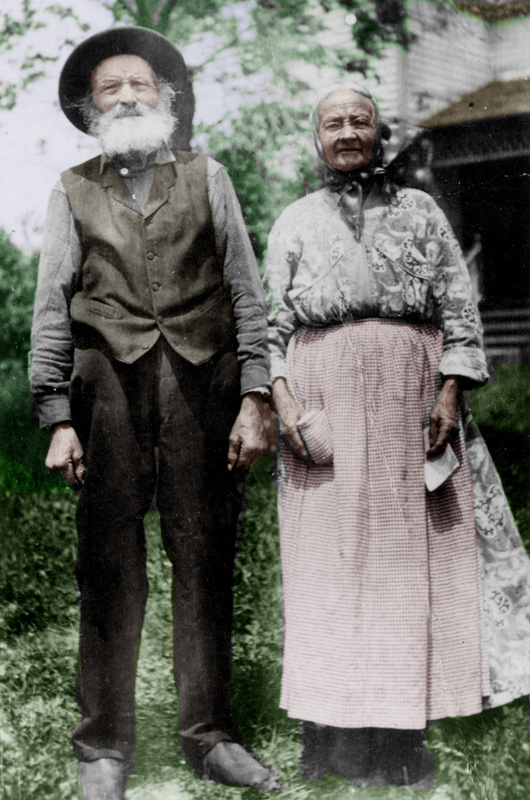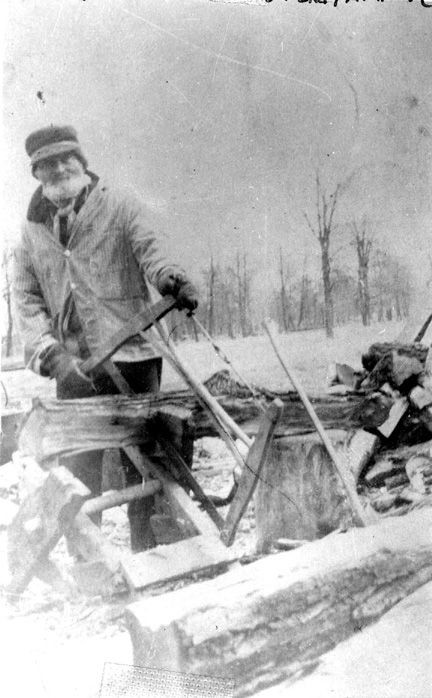My great-grandfather, Christian Meintzer, lived his life spanning two centuries and two continents. You met him (and this photo) early on (My Favorite Photo). Looking at him here, I wouldn’t peg him as a particularly “colorful” guy (despite my cousin Mark’s artful tint job to the original black and white!). He’s a farmer, just doing his thing. But his life had a little more color than that.

He was born 3 April 1830 in Dehlingen, Bas Rhin, Alsace.¹ You all remember hearing about “Alsace-Lorraine” in school, but it’s not really a place. It’s like talking about “Illinois-Indiana” or “Michigan-Ohio.” But both regions got batted back and forth between France and Germany from 1871 until the end of World War II, and Germany lumped them together. Alsace is the “leg” part of the “sloppy 7” shape they make. His parents were Chrètién [Christian] Meintzer and Christine Isel (Jessel).
Nothing colorful happens until he gets older. France required its young men to serve a mandatory 2-year military stint. From 19 April 1854 to 31 December 1857, he served in the 6th Division, 8th Regiment, of the French Army. Luckily, we still have his discharge papers! He served as a Hussar–light cavalry (horsemen) and was apparently proud of his uniform and his fancy plumed hat. He was not married yet.
Family stories claim Christian fought a dual with Napoleon over improper care of a horse. That would be really exciting . . . except that Napoleon Bonaparte (the person I think of when hearing only “Napoleon”) was dead before Christian was born! Christian actually served when Napoleon III (Louis Napoleon–Bonaparte’s nephew) was emperor. Somehow I doubt Napoleon III was mingling with the troops. So what gives?
From all accounts I’ve heard, Christian was not large (light cavalry, remember?), but was strong for his size, and wiry. His horse, and the others, would have been hugely important to his–and his regiment’s–survival, so I can see him picking a fight with someone who didn’t seem to be taking proper care of his mount–probably not the Emperor, though!
His time in the army also enlarged his vocabulary. The everyday language in Dehlingen would have been Alsatian–a dialect based on German (I’m grossly oversimplifying it!). According to his children (my grandfather and his older siblings), when he was angry, Christian would swear in French! His children did not speak or understand French, so while they knew he was saying something bad, they didn’t know exactly what was said. I hope they knew better than to try and repeat any of it–at least not around their father!
Two years after his discharge from the army, he married his first wife, Elisabeth Weidmann. They had four children, but nine months after their youngest (Catherine–Favorite Name) was born, Elisabeth and their oldest son died. Six months later, he married his second wife, Sophia Gaertner. They had five more children, but lost two.
In 1871, after the Franco-Prussian War, Alsace was surrendered to the newly-formed Germany. Residents were given two choices:
- remain French–and move elsewhere in France
- remain where they were–and become German citizens
I’m sure it wasn’t an easy choice for anyone to make. According to Wikipedia, 10.4% of the residents chose French citizenship,² though only 1/3 of them actually emigrated. Christian decided to stay, at least for a while. One granddaughter, Anna Kranz Schultz, told me when his son, Jacob, was born in 1876, Christian decided he needed to emigrate to the United States. According to Anna, he didn’t want his son to serve in the German Army when he grew up. It took until May 1881 for them to sail on the Labrador, moving his wife, two daughters from his first marriage, and 4 children from his second marriage, to America.
Reaching the Riverwoods (north and west of Chicago), the family settled into farming again. Not very exciting or colorful! Christian was 51 years old, and still had three more children to add to the family. He remained on the farm until at least 1910–probably until 1913, when his wife, Sophia, died. At that point (age 83), he moved around to the households of various children. He still spoke only German (Alsatian?).
As he aged, Christian didn’t really slow down much. My 2nd cousin, Richard Jahn (now age 92), once told me his dad remembered Christian out in the fields with his sons and sons-in-law, helping bring in the harvest. It sounded like they all pitched in with whichever field was ready to harvest, knowing they’d later have help with their own. Despite his age, Christian kept up pretty well with the pace of the younger men. We also have this photo of him, out sawing wood. Clearly he held his own with chores!

Anna also told a story about Christian rowing a boat out into the water and taking off all his clothes. He was living with her mom, Sophie, in Des Plaines at the time, very near the Des Plaines River. Did he go out to fish, and just got too hot? Was he going a bit senile? I don’t know. But at 83+, he was clearly still a colorful guy! He passed away 28 January 1922.
Most times we don’t know much about our ancestors’ lives. Social media didn’t exist. Photos are scarce–and sometimes tossed because they aren’t identified. Their stories, inconsequential as they may seem, disappear because no one takes the time to write them down. Making time to do that preserves these bits of color from their lives. It’s worth the effort.
#52Ancestors
¹”États-civil”, database, Archives Départementales du Bas-Rhin (archives.bas-rhin.fr), Dehlingen, naissance [birth] 1830, p. 4, no. 10, Chrètién Meintzer, 3 Avril [April] 1830.
²https://en.wikipedia.org/wiki/Alsace-Lorraine. Section 2.2 “From annexation to World War I,” paragraph 9 (“The Treaty of Frankfurt . . .”), citing reference 6.

THANK YOU for this!! Sometimes I wish my parents had never moved to California. I feel like I missed out on so much family, even though we visited most every summer. Des Plaines feels like home (as does Chicago and we were lucky enough to be able to live there during Howard’s fellowship in the 80’s).
My mother gave me quite a few photos which I need to unearth now. Many are duplicated of the ones Mark has, but there may be some new ones.
Thank you for researching all of this and taking the time to write about it!
xoxo Diedre Sent from my iPad
>
LikeLiked by 1 person
I can’t remember if I told you this, but the story my Mom always told was that he was a private bodyguard to Napoleon! As you said, we all think of THAT Napoleon! This makes more sense. Thank you! I love reading about our ancestors. xo. D.
Sent from my iPad
>
LikeLike
I had not heard that one! Thanks for sharing!
LikeLike